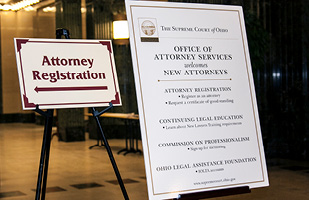Change to Out-of-State Attorney Admission Rule Adopted

The Court approved a new rule that will go into effect Sept. 2 that addresses out-of-state licensed attorneys’ ability to temporarily practice in Ohio.

The Court approved a new rule that will go into effect Sept. 2 that addresses out-of-state licensed attorneys’ ability to temporarily practice in Ohio.
The Ohio Supreme Court recently adopted a rule that would allow attorneys who passed another state’s bar exam to practice law in Ohio while their requests to be admitted to the Ohio bar without examination are pending. The rule will go into effect Sept. 2.
Currently, when attorneys admitted to practice exclusively outside Ohio move to Ohio, they must either pass the Ohio bar exam or wait until their applications for admission without examination are approved by the Supreme Court to practice law in Ohio.
Under the new amendment to the Rules for the Government of the Bar, an attorney applicant may apply to practice pending admission. This occurs while their application for admission without examination is pending if he or she meets the proposed amendment’s criteria.
Among the most notable requirements for out-of-state attorneys applying for practice pending admission are that the applicants:
- possess a clean disciplinary record
- are in good standing in all jurisdictions in which they are admitted to practice law
- have not been previously denied admission to the Ohio bar in the last five years under any circumstances
- certify that they have consented to be bound by the Ohio Rules of Professional Conduct
In addition, if applicants intend to practice Ohio law while their admission without examination application is pending, they must associate with an active Ohio attorney who is in good standing and has agreed to associate with the applicant.
Additionally, an applicant must notify the Court if he or she becomes subjected to criminal charges or a disciplinary investigation or sanction while practicing pending admission.
If the applicant is approved to practice pending admission, he or she may do so for no more than 365 days, unless permission is extended beyond that period by the Office of Bar Admissions.
An applicant’s ability to practice pending admission can terminate upon the occurrence of a number of events. Among them:
- the 365-day period expiring without extension
- the applicant’s application for admission without examination being disapproved
- disbarment, suspension, or resignation from the practice of law with disciplinary action pending in another jurisdiction.
Acrobat Reader is a trademark of Adobe Systems Incorporated.


